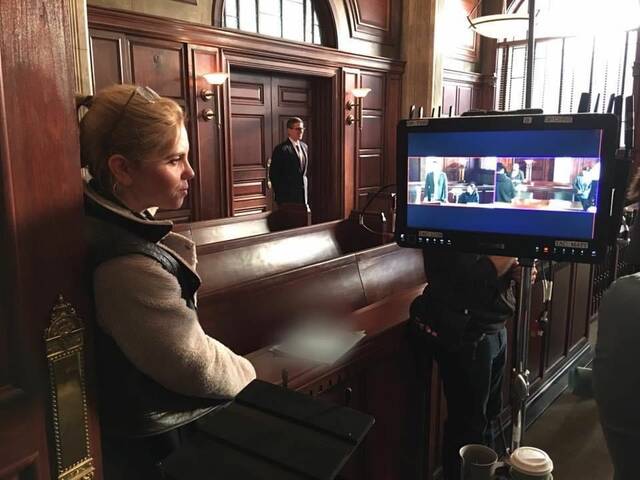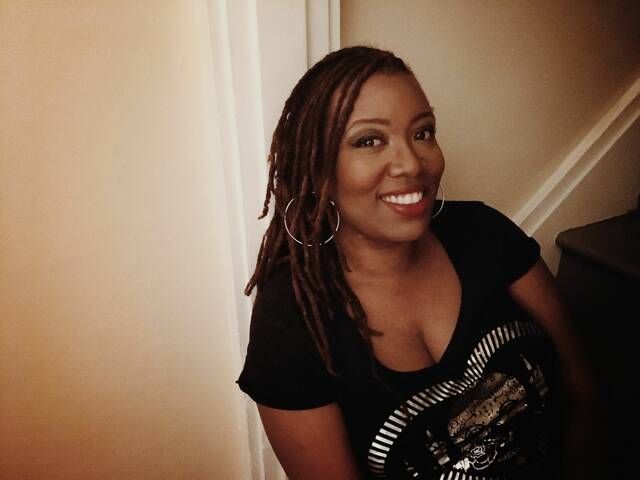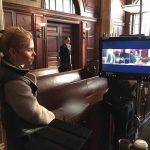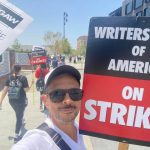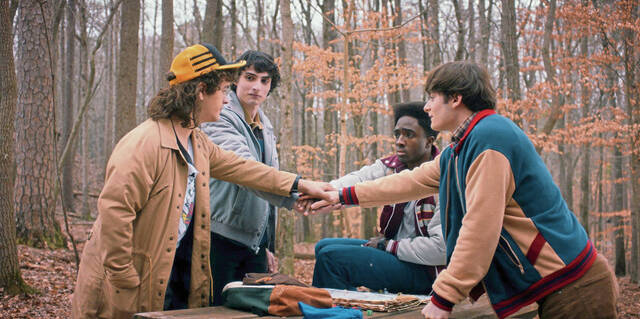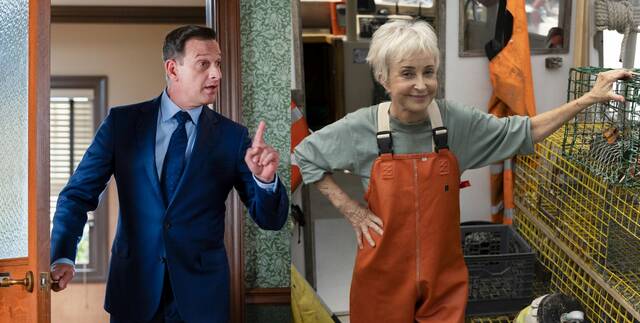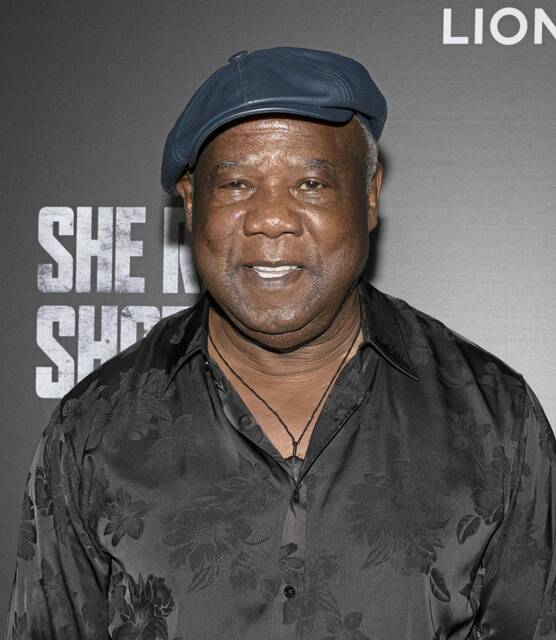Striking writers of scripted TV/streaming dramas and comedies have to make their case in an entertainment environment that’s changed radically since the last strike 15 years ago.
During that previous 100-day Writers Guild of America strike that began in November 2007 — in the heart of the 2007-08 TV season — viewers saw a pretty quick impact when their favorite primetime broadcast and cable shows ended their runs mid-season (remember that truncated first season of “Breaking Bad”?).
So far in this strike, now on day 15, the only immediate impact has been on late-night talk shows (“The Tonight Show with Jimmy Fallon,” “The Last Show with Stephen Colbert”), which went dark.
Back in 2007, there was little in the way of streaming — Netflix launched original series in 2012 — so when shows dried up, there weren’t myriad entertainment options viewers now have with subscriptions to Hulu, Disney+ and others.
The changes wrought by the hand-in-hand rise of cord cutting and streaming are at the root of the strike: Like a bull in a china shop, streaming tossed the economics of the entertainment industry into chaos.
To get a better understanding of why this strike happened, multiple writers from Western Pennsylvania who have been walking the picket lines in front of the headquarters of Disney, Warner Bros., Netflix and other companies in Los Angeles explain the near unanimity behind the labor action.
Swissvale native William Schmidt, a writer and co-executive producer on season three of hit cable drama “Yellowstone,” wasn’t a fan of past WGA strikes but this one he supports: “This is important. [WGA West president] Chris Keyser called it ‘an existential strike’ and it is.”
While there are the typical labor demands for higher wages, there are also more contentious, era-defining issues regarding residuals from shows on streaming services (financial compensation for replays of a show beyond a set number of telecasts), staff sizes for writers’ rooms, the duration of writers’ rooms (AKA “mini-rooms”) and regulation on the use of artificial intelligence in creating content.
While 2007-08 strike did gain the WGA jurisdiction over streaming, the formula that determines residuals from streaming results is a fraction of what writers get from reruns on broadcast television. This matters because writers rely on residuals for those times when they are between jobs.
To better understand what that looks like, North Allegheny High School grad Allison Intrieri, a veteran writer of “Law & Order: SVU” and most recently CBS’s “East New York,” said she wrote two episodes in the 2007-08 season of “SVU” and made more money off the residuals of broadcast reruns of those two episodes than she has made off residuals of the nine episodes of “SVU” she wrote between 2017 and 2019 during her second stint with the series. The more recent “SVU” episodes have surely been viewed more times on streaming, but nowadays shows rarely repeat on broadcast, which pays a much higher fee for reruns.
“’SVU’ is one of the most downloaded shows out there and they can play them [on streaming] forever and they pay us peanuts,” Intrieri said.
Before the streaming era, most series orders were for 13-to-24 episodes per season and the majority of broadcast network shows produced 22 episodes per season, employing writers for 35 weeks of the year, enough to sustain them year-round.
In the streaming era, some shows get a six-episode order. Instead of working 35 weeks on a show, writers may work 10 weeks or even less. Writers can try to cobble together additional jobs but they’re less likely to get hired on a second show when they’re considered in “first position” on the first show because it would mean having to leave the second show and return to the first show if it should get renewed.
O’Hara Township native Jonathan Green, a veteran TV comedy writer who most recently worked on “American Auto” and “Superstore,” pointed out another change: In the streaming era, studios will more often hire writers to do all their work and then send them home before production begins.
“Writers aren’t gaining the experience of being on set and rewriting and they’re not involved through the entire process,” including post-production work like editing, Green said, essential areas of knowledge if a writer hopes to advance and someday become a showrunner. “It’s a way that the studios are saving money by not paying writers through the entire process, but it also makes it tough to build a career as a writer because those younger writers aren’t getting the experience that they need to get to the next level. People stagnate at those lower levels for longer.”
So-called “mini rooms” are another point of contention between the WGA and the Alliance of Motion Picture and Television Producers (AMPTP), which negotiates on behalf of all the studios. The WGA wants to set a minimum number of writers to staff a show but studios prefer mini-rooms with fewer writers and for a shorter duration because it keeps costs down.
Schmidt, who dreams of one day having one of his shows filmed in his hometown when the new soundstage at Carrie Furnace opens, recently worked in a mini-room of three writers developing a limited series about a sports scandal. It didn’t get picked up.
“We had to write two scripts and a series bible in five weeks,” he said. “I loved the project but it was like a sweatshop, not because of the showrunner — he was great, the other writer was great — but it’s the new system.”
In the era of artificial intelligence and ChatGPT, the WGA also wants to ensure writers are not replaced by AI While some writers thought this would not be a sticking point because AI-generated material cannot be copyrighted, the AMPTP didn’t want to negotiate, suggesting instead an annual conversation on the issue. That response set off alarm bells among WGA members.
“They don’t seem to be concerned at all about protecting peoples’ incomes,” Green noted.
Even relatively new screenwriters have gone “pencils down.” Deesha Philyaw, who lived in Pittsburgh from 1997-2022 before being named the 2022-23 John and Renee Grisham Writer-in-Residence at the University of Mississippi, has been working on adapting her critically acclaimed short story collection, “The Secret Lives of Church Ladies,” for HBO Max for about two years.
“My co-writer Tori [Sampson] and I have been working on the pilot and building out the series and we had something to turn in to HBO Max and got it in just a few days before the strike, right under the deadline,” Philyaw said, noting she’s been learning about the WGA strike rules as part of the process. “When they say ‘pencils down’ that means no edits, no tweaks, nothing. … Solidarity is important.”
With no picket line to join in Mississippi, Philyaw is focusing on her first novel (about a megachurch pastor’s wife) and another collection of short stories.
Back in Hollywood while taking a break from walking the picket line Friday in front of Amazon Studios, Washington, Pa., native Abraham Higginbotham (“Modern Family,” “Uncoupled”) said he and the other “Uncoupled” writers had outlined five episodes of the show’s second season for Showtime when the strike began. He called the strike a “horrible last resort” because of the way it damages the Los Angeles economy and its impact on other crew members who are now out of work. But he also sees it as necessary.
“I’ve had a great seat at the table and I’ve been very fortunate, more than once, to make a good living in this business and to save and to learn the job because I had showrunners who let me and encouraged me to,” Higginbotham said. “And we were paid for the whole season of the show, not just pre-production, which is what they’re doing now. So [this strike is] really for the younger people who don’t have that experience and are not making what I made, even when I was starting out.”
Adding to Hollywood’s anxiety: unions representing film/TV directors (DGA) and actors (SAG-AFTRA) have contracts that expire June 30.
“We know there will be conflict,” said Todd Holland, a Kittanning native who grew up in Meadville, in a video message posted last week by the Directors Guild of America negotiating committee.
If either the DGA or SAG-AFTRA makes a deal, that might help bring about a settlement between the writers and the studios.
But if one or both of the other unions goes on strike too? Then this all turns into a Hollywood strikeageddon.
NBC’s fall
NBCUniversal programming president Jeff Bader took great pains to claim in multiple trade publication interviews last week that NBC’s fall programming lineup is “the exact same schedule” that NBC would have unveiled if there wasn’t a writers’ strike. And while that may be true now, it won’t be true come fall if the writers’ strike goes more than another month because at least two and two-third days of the NBC schedule will have to be remade as the network doesn’t have Dick Wolf-produced shows in the can (the “Chicago” series, the “Law & Order” shows).
NBC has yet to decide whether to keep or cancel “American Auto,” “Grand Crew” or “Young Rock.” Reba McEntire will be in a red swivel chair alongside John Legend, Niall Horan and Gwen Stefani as a judge on “The Voice” this fall.
Here’s NBC’s current fall schedule (new series in bold):
Sunday
7 p.m. “Football Night in America”
8:20 p.m. “NBC Sunday Night Football”
Monday
8 p.m. “The Voice”
10 p.m. “The Irrational:” Based on author Dan Ariely’s “Predictably Irrational,” Jesse L. Martin stars as a behavioral scientist who aids law enforcement in solving crimes.
Tuesday
8 p.m. “Night Court”
8:30 p.m. “Extended Family:” Divorced couple takes turns living in the family home for the sake of their kids. Jon Cryer, Donald Faison, Abigail Spencer star.
9 p.m. “The Voice”
10 p.m. “Quantum Leap”
Wednesday
8 p.m. “Chicago Med”
9 p.m. “Chicago Fire”
10 p.m. “Chicago P.D.”
Thursday
8 p.m. “Law & Order”
9 p.m. “Law & Order: SVU”
10 p.m. “Found:” Missing persons drama starring Shanola Hampton and Mark-Paul Gosselaar.
Friday
8 p.m. “The Wall”
9 p.m. “Dateline NBC”
Saturday
7 p.m. “Big Ten Pregame”
7:30 p.m. “Big Ten Saturday Night”
Coming at midseason: “Lopez vs. Lopez,” “La Brea,” “Magnum P.I.,” “Law Order: Organized Crime” and “Password” return and will be joined by a new, unnamed and yet-to-be-described “America’s Got Talent” spin-off as well as:
“The Americas:” Tom Hanks narrates this 10-part natural history series.
“Deal or No Deal Island:” 2005-19 game show relocated to an island with “twists behind every palm tree.”
Fox’s fall
Wisely, Fox did not announce a fall schedule, delaying that until a later time when there’s more clarity about whether the writers’ strike ends in time for the usual late July/early August start of filming on fall programming.
Fox ordered second seasons of reality competitions “Special Forces: World’s Toughest Test” and “Farmer Wants a Wife.”
New series that will air during the 2023-24 TV season are:
“Doc:” Minneapolis doctor incurs a brain injury that erases the last eight years of her life. She tries to get back on track professionally and personally.
“Rescue: Hi-Surf:” Follows the professional and personal lives of lifeguards in O’ahu. Think: “Baywatch: Hawaii” presumably with better writing (Carnegie Mellon grad John Wells executive producers with Matt Kester, who wrote episodes of filmed-in-Pittsburgh drama “Outsiders”).
“Krapopolis:” Animated comedy from Dan Harmon (“Rick and Morty”) set in ancient Greece.
“Grimsburg:” Animated comedy about a brilliant detective (voice of Jon Hamm) who prioritizes his own personal problems over the crimes he’s supposed to solve.
“Snake Oil:” David Spade hosts this game show where contestants are pitched business ventures, some are real and some are fake and players have to deduce which is which.
“We Are Family:” Jamie Foxx and daughter Corinne host this game show where non-famous relatives of celebrities perform duets with their hidden famous family member. Everyone in the studio audience is a contestant tasked with guessing the identity of the secret celebrity.
Fox also ordered new seasons of Gordon Ramsay’s “Kitchen Nightmares,” which last aired in 2014, and “Lego Masters: Celebrity Holiday Bricktacular.”
Kept/revived/canceled
Netflix renewed competition series “Outlast” for a second season.
NBC will bring back Canadian import “Transplant,” previously canceled by NBC after its second season last year, for a 3rd and 4th season to air sometime in 2023-24.
Deadline.com reports Showtime is developing sequels to “Weeds” and “Nurse Jackie” with original series stars Mary Louise Parker and Edie Falco, respectively, attached to return.
Netflix canceled “Lockwood & Co.” after a single season.
ABC canceled “Alaska Daily,” “Big Sky” and “The Company You Keep.”
FXX’s “Archer” will end with its 14th season, debuting at 10 p.m. Aug. 30.



